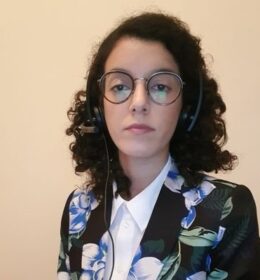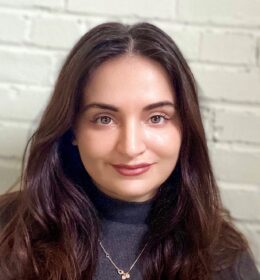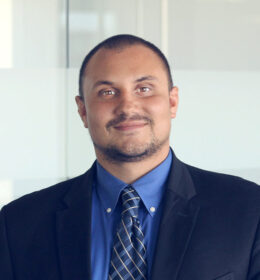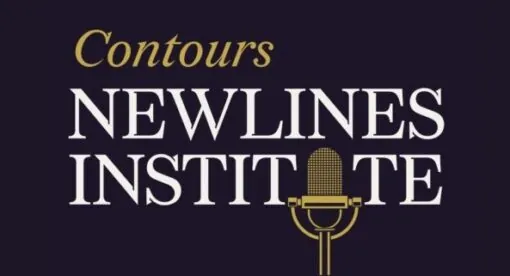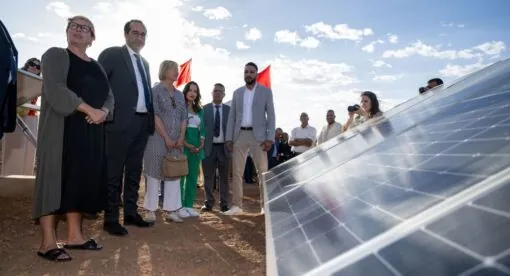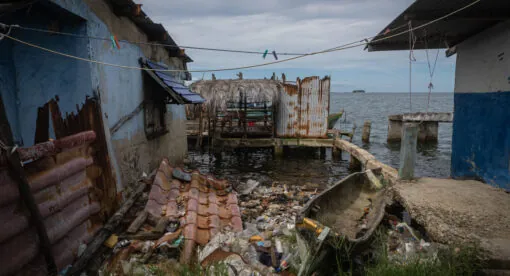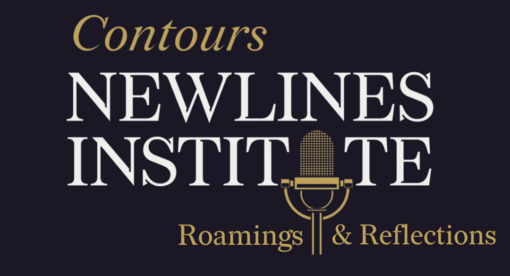In this episode of the New Lines Institute’s Contours podcast series, widely respected academic Dr. Dana El Kurd sits down with Rasha Al Aqeedi and Nicholas Heras to discuss her groundbreaking research on an emerging generation of Palestinian civil society and political activists. Dr. El Kurd provides a deep dive on her innovative work on the ground in Palestine, her assessment on what the future might hold for Palestinian activism, and whether there is way forward for the Palestinian people to achieve their human dignity in the face of oppression from both the Palestinian Authority and Israel. She is the author of the highly regarded two-part New Lines Institute series on this subject, “The Strengthening of Palestinian Civil Society Activism.”
Nick Heras: Hello everyone, and thank you for joining us for today’s episode of the New Lines Institute for Strategy and Policy’s Contours podcast series. Today I am joined by a special guest, Dr. Dana El Kurd. Dr. El Kurd is an assistant professor of political science at the University of Richmond. She is a world-renowned expert on authoritarian regimes in the Arab world, state-society relations in their world and the impact of international intervention in the Arab world. She’s also the author of a special New Lines Institute two-part series on the strengthening of Palestinian civil society activism. I’m also joined by my colleague Rasha Al Aqeedi. Rasha is the senior analyst and program head for nonstate actors here at the New Lines Institute. Today, we’ll be discussing the future of Palestinian civil society and activism in a deep dive chat with Dr. El Kurd. Rasha will lead off the discussion. Rasha, without further ado, I’ll hand it off to you.
Rasha Al Aqeedi: Dana, thank you so much for joining us. Congratulations on your two-part essay that you did for new lines on strengthening Palestinian Civil Society. I think it’s really important that finally, someone is speaking about the Grassroots movements, the people on the ground and this new generation of Palestinians and how they’re coping and dealing with the occupation, discrimination, apartheid, and how their message is being distributed and how they’re sending it across the globe, whether it’s via social media, or different kinds of activism. I would like to ask you, Dana. How do you see this movement? Or how do you see these organizations moving forward, especially now with, in the light of Israel’s recent classification of several of these organizations is terrorist groups. Do you feel that their strategy is going to change? Will they fight back? Of course, in unarmed ways. Will they counter these – will they try to counter these accusations? Where do you see them moving forward?
Dana El Kurd: That’s a great question. And also thank you for having me on the podcast to discuss this kind of in more detail. So I think that professional civil society is one part of the puzzle. Because what I was trying to demonstrate in my essay is how Palestinian youth activists were able to utilize the contributions and advantages of more professionalized civil society groups to go beyond just documentation or speaking to the Western media or something like this. To actually mobilize people on the street, to actually engage in direct action, to show up in Sheikh Jarrah, show up instead of one, and physically resist the expulsion.
When we talk about what happened recently with the Israeli government, calling six of some of the most effective civil society organization in Palestine – the professional civil society organizations, as terrorist groups – what that means is that they’re not dumb. They’re aware that these civil society groups are effective at not only engaging in like the scope of their own work, whether it’s documentation, whether it’s helping prisoners, whether whatever, but also going beyond. serving as sort of like focal points for different activists to meet and to strategize and to build on what civil society can kind of create as a basis. So I think that explains – and this has been said by some of the heads of these groups – that because we are effective, we have been targeted.
Now, what happens moving forward? At the professional civil society front, as long as there is an outcry and there is the light is continuing to shine on what’s happening to them, possibly the Israeli government will not take actions immediately against them. But as soon as it wanes from people’s interests, we are very concerned. The Palestinian activists and the Palestinian members of the civil society, organizations themselves have discussed this. I’m not engaged with any of these civil society groups particularly, but even from the outside, as somebody who cares about freedom of speech and justice in Palestine, I’m also quite concerned that we will not only see funding stop, we’ll see them heavily hampered in their ability to continue to play this role that I described in the essay. That’s a concern. Now, on the front of the direct action, the more kind of street mobilization, there are still some initiatives coming out from what happened in May and June with certain activists that were involved in this, in the direct mobilizations there. They’re trying to build on that kind of momentum. They’ve set up like a dignity fund for the people who got arrested during the last wave of protests, people providing legal aid, they call for like, protest and solidarity outside the courthouses when there are like, certain cases, and all of these things are happening. But given what I’ve seen and given some of the conversations I’ve had, it seems a little piecemeal – for obvious reasons, given all the repression, it hasn’t built until it’s a structured overarching strategy. Similar to, let’s say what we saw in the first intifada of the unified national leadership of the uprising. So still kind of maybe in its early stages.
RA: And you brought up a really good point about waning from public interest and we’ve seen this with every time there’s something going on in Palestine that there’s – public interest peaks for a few weeks and then it kind of dwindles down because people have, in general, a small appetite, let’s say, or limited appetite for one thing and then something else happens and they move on and Israeli authorities, usually wait. So they exploit that, that there’s no longer media coverage. It’s not like the hottest topic. And then they continue doing what they had been doing. So, do you feel that if public interest decreases in this issue, in particular on the crackdown, do you feel that Israeli authorities might actually escalate, and it might actually get to level of arrests and perhaps even worse with these groups?
DE: I think that that’s a real possibility. That’s a real possibility. Now, I’m not trying to make the claim that it’s only public, international public attention that stops them. There are – activists on the ground have engaged in the strategies to counter Israel oppression on their own, but it obviously helps when there’s international attention, international pressure. When people are sending letters to Blinken and sending letters to their congress people about what’s happening about how dare they, you know, designate these organizations as terrorist groups. All of these things, obviously create a sort of buffer. I am personally concerned that we’re going to see arrests. And the members of these organizations themselves have said that this is, this is definitely on their minds. And they don’t, they just don’t know when it will happen.
RA: One more question about these groups: How is their relationship with the Palestinian Authority? I think we’re all aware there is sometimes some kind of tension between also civil society and the Palestinian Authority, but it’s not something that the authority will probably ever reach an agreement with Israel on when it comes to crackdown or classifications. But how did the authorities react to this classification, and what’s their relationship in general, if you can comment on that?
DE: So these groups are highly competent, highly professional, have a lot of integrity; they have certain groups that are related to like human rights documentation and things like that, have discussed the Palestinian Authority’s role. They’ve written reports about the Palestinian Authority’s repression. So, they don’t have a great relationship with the authorities and they’re not one of the groups. There are certain civil society groups in Palestine that are attached to the positive. These are not the – this is not amongst them. Part of the discussion around when they were designated as a terrorist organizations and basically people pointed out that this also helps Palestinian authorities for oppression, that they benefit from basically critical voices being silenced. And, and we’ve seen that. Not at the level of, like I said, kind of professional organizations, but we’ve seen that. Also, at the level of like individual activists or grassroots mobilization. They’ve coordinated around repressing dissenting voices because the dissenting voice that is speaking out against Israeli repression is also criticizing the Palestinian Authority’s rule.
NH: Well, thank you very much, Dana, for those detailed answers to Rasha’s questions on the current state of this rising generation of Palestinian activists. It’s quite interesting because I wanted to sort of pick up on where Rasha left off. I have a personal assessment that one of the effects of the Oslo process and establishment of the Palestinian Authority was that it in effect remodeled what had been the civil administration that the Israeli military had imposed on Gaza and the West Bank after the 1967 war up until basically the signing of the interim agreement that led to the establishment of the Palestinian Authority. And that in the subsequent decades, what we’ve seen essentially is a Palestinian leadership that is managing Israeli security with an increasingly deteriorating state both in terms of the provision of civil services as well as in political participation. And you can see some of the frustration that bubbled over this past spring among Palestinians. Again, about this issue, about the canceling of the elections for the Palestinian Authority and just sort of the sclerotic leadership within the Palestinian Authority that doesn’t seem to represent the growing youth population in Palestine. Could you unpack for us a little bit how the relationship of the Palestinian Authority plays against or could in some ways potentially be used by this rising generation of Palestinian activists to advance their goals?
DE: I’ll start my answer discussing the Palestinian Authority’s development from the onset that has been kind of an exclusionary organization. There were [inaudible] amongst Palestinian political groups around the role of the Palestinian Authority, how it was created, who was excluded from that process, how it kind of supplanted grassroots, local organizing to some degree and it led to these developments where it sidelined Palestinian efforts to focus on kind of a state building process that now we know Israel had no intention of pursuing instead of continuing on a different path through the original Palestine Liberation Organization and through, you know, resistance of the Israeli state on different fronts that way. So from the onset it was already kind of splitting from what Palestinian society wanted.
Now, there were large segments of Palestinian Society also, that were very supportive of the Palestinian Authority and its PLO leadership that went into the Palestinian Authority, including ****[00:10:50] and all these people who had a lot of legitimacy amongst a non-insignificant portion of the population. A lot of people believe that this was actually a moment that could lead to a state for Palestinians. Many people left the diaspora and came back to the West Bank and Gaza to attempt to help build this new state.
And so, I’m not saying like, it was identical from the onset, but it became clear, I think, after the 1999 and particularly after the second intifada, that this Palestinian Authority was presiding over a process that wasn’t getting Palestinians what they wanted. And instead of rerouting their policies or rewriting their objectives to come more aligned with Palestinian public opinion, they continued to drift farther away. They continued to set themselves apart from the Palestinian public. And then after the 2006 elections in which Hamas won a plurality and was not allowed to take office essentially, and outgoing leadership of the Palestinian Authority under basically Fatah political party with American support and encouragement facilitated that process and led to a split between the West Bank and Gaza. Since then, they’ve even become more unaccountable to the Palestinian public because there haven’t been elections, and there haven’t been any ways to traditionally send a signal from society, like, we want this, or we don’t want, that or we want this leadership or whatever. There has not been an attempt to make themselves accountable, and frankly there has not been international support for Palestinian society like holding their leadership accountable.
So when in the last year, when Mahmoud Abbas announced the elections, there was like radio silence from the U.S. administration because they don’t actually want Palestinians to have a say in their leadership or to actually change the trajectory of the Palestinian Authority. There was no actual support for elections. Then he ended up canceling them and there was a huge issue there. Now, what people are attempting to do, there are a few initiatives. People are saying they want to revitalize the PLO – that’s been discussed a lot, by a couple of different Palestinian like, scholars and activists – but activists that live there, like on the ground, are attempting to create alternative institutions. There’s Jeel al-Tajdeed al-Democraty, which is like a New Generation for Democratic Change, I think is the translation there, that are saying, like, you know, “We’re going to create alternative institutions to be incubators for future leaders and to introduce Palestinians that have been fragmented for a few decades now to each other so that we can kind of start building the ties. we need to create a cohesive movement, moving forward.” They had attempted also to run for the elections or to create a alternative parliament or whatever. Obviously, when the elections were cancelled, they had to take different routes, but there are attempts to create different accountability mechanisms that bypass the Palestinian Authority, but the reality is like those are still nascent and the Palestinian Authority continues to remain to a large degree unaccountable in spite of a huge level of dissatisfaction. Getting the latest polling, I think of something like, 8% of Palestinians thought Mahmoud Abbas did a good job. And lots and lots of people are very unhappy. And then we saw the protest against the Palestinian Authority’s repression and killing of an activist. And so, so, all of that happens, but it’s not leading to a lot of changes because at the end of the day Palestinian Authority is insulated from accountability by Israel and by the United States and the other donor countries.
NH: So can I pick up a little bit on this thread because it is important, and I think one of the dynamics that’s often forgotten and we saw it being communicated this past spring, is that the Palestinian reality on the ground in Palestine is in living under different authorities that are imposed upon them, right? So you have in Gaza, you have Hamas-dominated reality with other various groups that exist in sometimes harmony, sometimes uneasy say to begin with Hamas. You have the power of the West Bank, where you have the PLO Fatah-led Palestinian Authority, you have Jerusalem, which has its own special case, which you’ve brought up in your analysis for us, New Lines Institute. And then of course, you have the Palestinians with Israeli citizenship inside the state of Israel who have their own realities, but one of the common threads this past spring during the “Unity Intifada” was the sense of suffocation. Being part of the international audience watching these events play out, you got this real palpable sense that the Palestinian people, especially the young people, have the sense of suffocation, no matter where they are in this divided land. And how do these activist groups try to bridge these divided areas in which they live? How do they try to create a common narrative? And is there a trend line in their common narrative? By that I mean is there a common overarching goal that they are trying to work toward?
DE: Yeah, good question. So I think that activists recognize that the piecemeal, fragmented attempts to deal with these different communities or to address the concerns of these different communities has been detriment to their mobilizing power and to their ability to face the Israeli state. So it was very openly attempting, you know, so the discourse and the framing of everything that was, that happened this spring, was very openly, “We all have the same struggles.” Whether you are a citizen or not, whether you’re in the West Bank or Gaza, whether you’re in East Jerusalem or wherever, we all are struggling because of the state, and because not just of a policy consideration. Like we’re not just talking “end the occupation, which obviously is important, but we’re talking Israel settler-colonial nature needs to be addressed. Israel as a settler-colonial state that is attempting to basically remove the indigenous population. That is the framing that was discussed. The national consciousness was literally the words, that were used: raising national consciousness for people, maybe who are like, less politicized or whatever, but still came out in the last, in the last period.
Activists recognize this is a shared struggle and they’re being very intentional about framing it that way, and making sure that their actions are along these lines as well. So, for example, when protests were happening in East Jerusalem, when direct action was happening in Sheikh Jarrah … you had activists from Palestinian communities within the Green Line come and join and participate and help organize. There were these tours that were set up to like bring Palestinians let’s say from like Nazareth or from ***[00:17:15] , or whatever within the Green Line inside Israel to like different parts of East Jerusalem and vice versa to kind of break down these barriers. The alternative youth body Jeel al-Tajdeed are attempting to make also tries to break these lines. It’s it has members from Gaza. It has members from within Israel and different parts of historic Palestine. So it’s a very cognizant attempt to say, no, like this is a shared struggle, and the next steps are to raise national consciousness. This is a national issue and we have a national grievance. This is not an issue of human rights. This is not an issue of ending the occupation or fixing racist policies within Israel. This is an issue of we are a Palestinian people that demands national rights and self-determination.
So, yeah, they’ve been very clear about that. Now in terms of what are the shared demands, that gets a little bit more tenuous, I’d say and I think that this is – obviously I’m not an activist and I hesitate sometimes to give my opinion on this because it seems like I’m lecturing or something, but just from my perspective and given that I study mobilization as my topic of expertise in my work and my research, this is I think what needs to be discussed and hashed out very soon and in the immediate future, because that continues to be kind of a vague area. So there are some people within this say broad coalition of groups that engaged in some of the actions during the Unity Intifada or like during the events of May and June. Some of these groups will stand by nationalism. A lot of advocates abroad also like Palestinian and non-Palestinian advocates abroad also been discussing a rights-based approach and a binationalist solution to the conflict, so that’s one thing.
But then others really reject that. They really reject the binational framing for a variety of reasons. They’ll discussed instead concepts like decolonization. But then, what does that mean? In Arabic, you might see more clarity on what they mean when they say that word, but then when it’s discussed for an external audience, it’s not really fully fleshed-out. Or essentially, my point is they’re not talking about endgame or like end goals right now. I think maybe they’re – the stage where they’re at is to build that national consciousness and seize on the momentum of the Unity Intifada so that people can stay mobilized, stay interested on the ground.
So I understand that maybe those discussions are, they seem premature, but the looseness of strategy can also be a detriment because it’s like, then what are you actually asking for? How do you get people to continue to advocate along the same lines as you if people aren’t clear about what you want? And there’s a very small segment of the population that still thinks that the two-state solution is the paradigm that they’re going to follow. But also the one-state solution has very little popularity. In the last polling was like, 20% of Palestinians believe that the one-state solution is what they should pursue. So it’s like then what are you left with? Well, that’s where activists and thinkers and intellectuals and scholars, that’s where they have to articulate something. And I don’t know that they’ve articulated that fully.
NH: I want to build on this point, this idea that right now, we have this nascent movement. It’s authentic to the land of Palestine. It cuts across age groups, social classes. It is linked into the Palestinian diaspora and it has also in some ways become a inspirational movement for other movements in other parts of the world – here in the United States, we saw this past spring during the Unity Intifada, a number of civil society and activist groups United States begin to associate themselves more fully with the Palestinian cause.
So I want to pick on this point. You’ve brilliantly laid out for us, Dana, the fact that a key dimension to this movement is it needs to decide what it wants. It knows what it’s against, but it hasn’t quite articulated what it’s for. And it does have a power that the Palestinians have had historically, which is the power of no – the power to say no, we are in fact a people, were not just indistinguishable mass of Arab people; no, we do have the right to self-determination; no, we do have the right to have human dignity. This has been a powerful weapon, if you will, political weapon, the Palestinian people have waged in difficult diplomatic terrain, as well as in difficult circumstances on the ground. As we look forward, one of the dynamics that you see rising, the discussion here at least, in the United States, that seems to be getting to be reflected more in the Israeli discourse is what I would call the hydrogen bomb that the Palestinian people could put into this conflict right now, which is one state, one person, one vote.
When you see the rising concern here, the discourse among supporters of Israel about what if the Palestinians unite behind this. Is there, in fact, a U.S. administration that could say, uh, sorry guys, you don’t have full civil rights. You don’t have the right to be able to be in your land. That seems to be entering more to the discourse and what I’d like to ask you is, do you see a scenario where these Palestinian movements that are beginning to become more coherent, are beginning to test different strategies, do you see them united around that concept? Because that seems to be a great fear right now within this community that focuses on the future of Israel.
DE: So I think amongst the Palestinian diaspora and advocates and allies to that diaspora outside Palestine, that is a mainstream thought today. I don’t know anybody who takes the two-state solution seriously. Now when you say like the fear is Palestinians will unite around that idea – to various degrees, they have united around that idea. I mean, up till 1988, I think, the PLO, that was their official line and this divergence to the Palestinian Authority and the attempt to create a two-state solution from their perspective, like that was a divergence from the official line. That was the PLO’s line for a very long time, which is one democratic state.
So, so, my point is to some degree, I think most people agree that the two-state solution is dead and there’s going to be some form of a one-state solution. That reality for pro-Israel advocates that has already arrived. I don’t think that that means that an American administration is going to change to accommodate that thinking. But in terms of public opinion on that, I think that that has arrived, especially among activists. What I was saying is not so clear is what vision of the one state. That, I think, is still a topic of debate and a topic of discussion – to be frank, maybe less so debate because people don’t want to talk about it honestly and hash things out thoroughly. But most Palestinians on the ground that are like active in some of these movements and some of these crucial organizations that were responsible for a lot of the mobilization that we saw they’ll use the term as I said, decolonization, decolonizing Palestine, but when we go back to where this thought comes from, like scholars who write on decolonization, again it becomes very mushy as to like what the endgame is there then. Because some scholars will say it’s either total annihilation for the indigenous population or total victory.
But practically, what does that mean? What do they expect is going to happen the decolonization or when they’re advocating to decolonize Palestine? Do they mean that they will be elected to the highest offices of a one state and reorganize the state’s agenda? It’s not very clear. Does it mean that they think that either they will be completely ethnically cleansed by the Israelis or take control? Practically speaking people who use the term decolonization, which I am sympathetic to, I think that we should decolonize settler-colonial states, but what are you advocating for? Because when you say binationalism, then people don’t like that either. So, sorry for the long winded answer, but basically I’m trying to say I think the one state advocating, for a one state has come about. That is the mainstream main line. What that one state will look like, as what I’m saying, remains a question that I think Palestinians have not fully been willing to discuss even amongst themselves.
NH: Thank you very much, Dana, for that thoughtful and detailed answer. And I would just say that if the Palestinians can come to a consensus on what that vision is, that could potentially be a power overwhelming to move the process of achieving their aspirations for human dignity.
RA: Dana, thank you very much for those detailed answers. That was very enlightening in many ways. So, my last question to you is, if Palestinian civil society was given a platform on the global stage amongst policymakers, the key policymakers in the world – and this is not to suggest that you are a spokesperson on their behalf, but they were asking how they can help and what they can do to support Palestinian civil society to achieve a one-state solution that is satisfactory for all. Now, you just said that there appears to be no direct vision amongst Palestinians themselves on how this one state would look. But the time has come to have this discussion. But how can the international community actually support this and engage with this, especially now again in the light of classification of several groups as terrorist fronts or how they decided to call them? But let’s say you were in direct conversation with key policy makers. What would you say to them?
DE: The immediacy, the problems that our most immediate that need the most assistance is, for the international community, whether that’s civil society internationally or policymakers like at the governmental level, to pressure Israel to not repress Palestinian civil society, to not allow Israel to designate at its whim, with secret evidence, which groups are terrorists and which are not and to allow for Palestinian civil society to function because not only is it, like, the moral position to take, but there are growing signs that – and it makes perfect sense – where if there are certain avenues of political participation are cut off, it makes other avenues the most strategic option, including armed resistance. And not to say that the Palestinians as a colonized people do not have the right to armed resistance or any other form of resistance, but if we care about Palestinians losing their lives and violence and the impact of these kinds of things, then we shouldn’t push people in a corner. So, that’s my immediate thing is, you know, stop the repression of Palestinian civil society on the Israeli front.
On the Palestinian front, stop being the buffer between the Palestinian Authority and its people. Allow the Palestinian civil society. Palestinian society generally, to pressure its leadership, to demand change at the Palestinian Authority level, whether it’s through elections, if that’s what people want, or through alternative institutions, whatever it is that they want, but none of that will have any impact if the Americans act as the buffer between the Palestinian Authority and Palestinian people, which they continue to do. So that’s kind of the immediate thing. Still immediate about possibly outside a little bit outside our scope of the scope of our discussion, but like an end to continued settlement of highly sensitive areas. Well, settlement everywhere, but particularly in areas like in Jerusalem, where basically realities on the ground are shifting from year to year. The neighborhood where my family is from looks different from when I saw it two years ago. And there is a very rapid theft of Palestinian land in these places. Again, that kind of ethnic cleansing by another name needs to stop and I know what I’m saying is – seems fantastic. Like what policymakers actually going to listen to me when I demand something like this? But this is the most immediate thing that we want.
RA: I’ll respond to that, Dana, quickly. Why asked that question is because the narrative has shifted so much. Like let’s just go back 20 years ago. We would not be having this conversation at all. There would have been – and I’m old enough to remember the first intifada, the second intifada – we were under Saddam at the time, I was still in Iraq, but I remember how the international community responded ***[00:29:45] and all the atrocities at the time that were being committed live on television, and it was documented. The world was silent. It was very clear that there was an aggressor, and there was one party in the wrong, and there was one party that was clearly favored. That has changed. And why I’m asking that question is that it appears to be there is enough at least to some level, at the popular level, there seems to be enough pressure to actually make changes.
Now, has it really impacted the administration – speaking about the U.S. administration, I don’t see so much difference, but I also know that, if we look at Congress, if we look at U.S. policymakers, the narrative has really shifted. Everything ties in together from the Black Lives Matter movement, to even American activism. How they’ve changed. The discussion on Palestine has really changed. This is why I’m asking the question that can this pressure also at the international level be mobilized into some kind of action? And I think these demands within the scope of how much things have changed – and there are people are already calling for them, it just hasn’t really been materialized yet – I think the logical demands to be active, given the influence and the leverage that the civil society movement has because the narrative has shifted so much, so it’s possible.
DE: Yeah, I guess you’re right. I mean, we saw with like the explosions in Sheikh Jarrah. Yes, the Israeli court did not take a decision in favor of the Palestinians in Sheikh Jarrah, but it also didn’t expel them. Their hand is being stayed. So I, I see what you’re saying. In the immediate sense, we have to protect Palestinian civil society and penalize Israel for engaging in repression. Whether it’s designating these groups as terrorist organizations or facilitating lynch mobs that happened a few months ago against Palestinians, within those who hold citizenship and those who do not, there was no accountability for the fact that the Israeli government was implicated in those lynch mobs. If you think that this is a reasonable demand, then [inaudible].
RA: Thank you, Dana. Thank you so much.
NH: Well, thank you, Rasha and Dana, for joining us for this important discussion on the future of Palestinian civil society and some of these open questions on how to create a sustainable and just peace in the Middle East. Until next time, thank you to all our listeners, and all the best.
Although transcription is largely accurate, there could be some inaccuracies due to inaudible passages or transcription errors.

